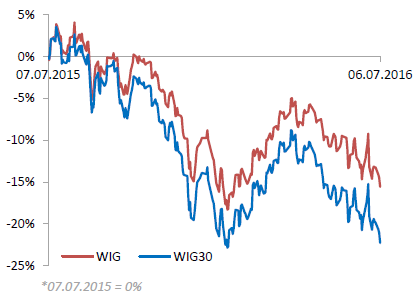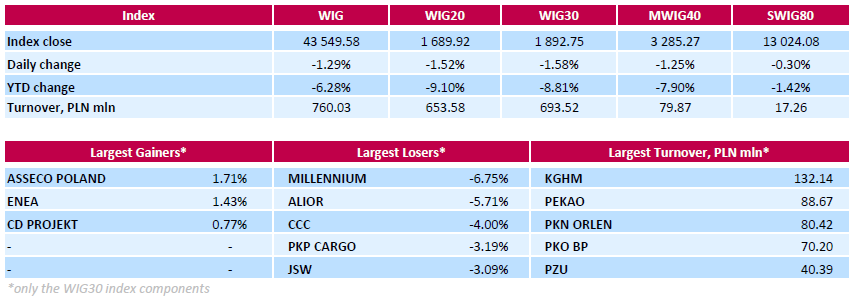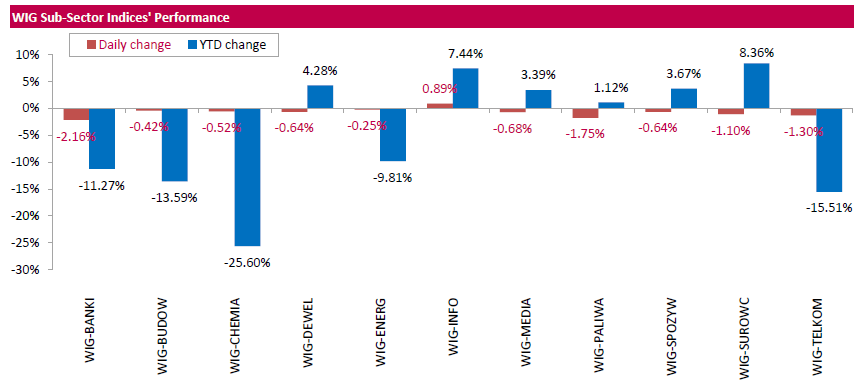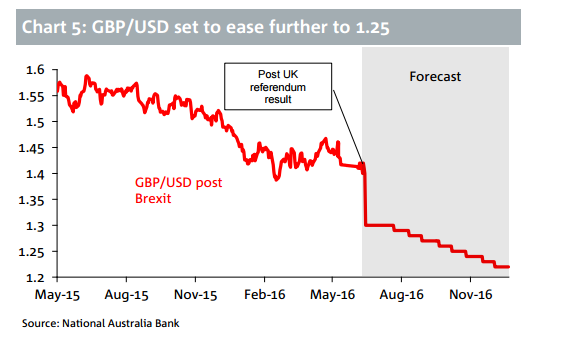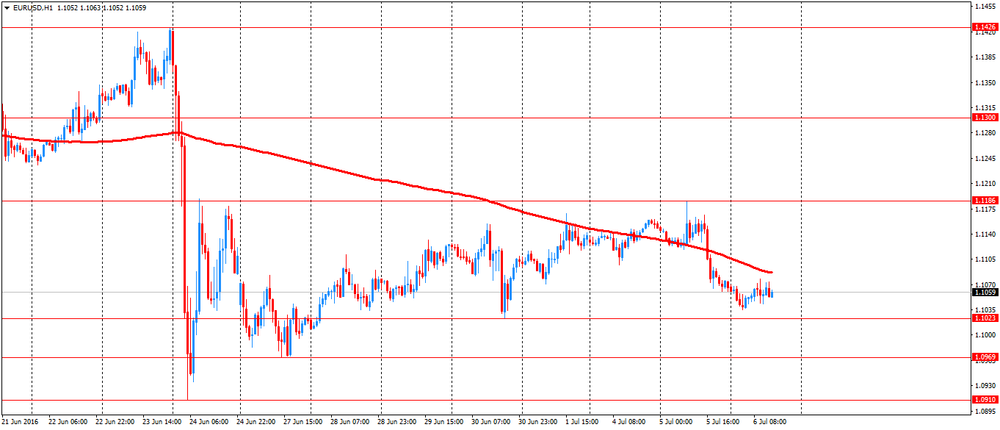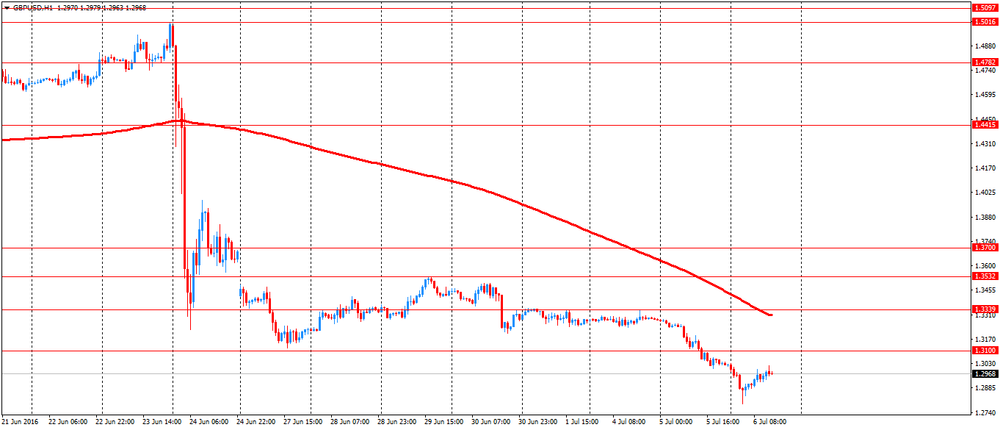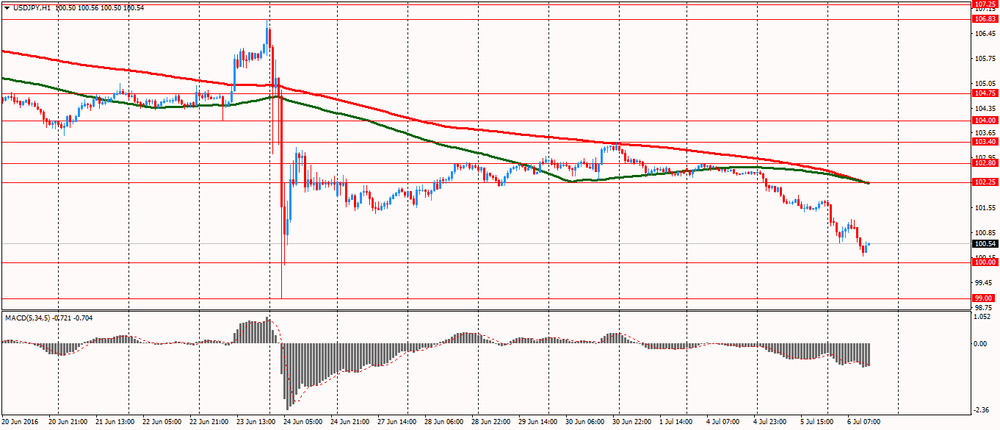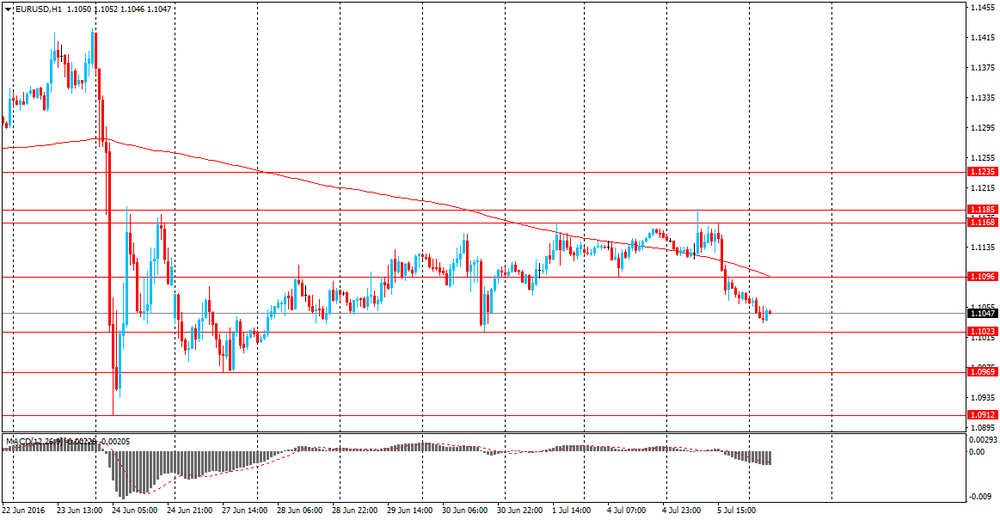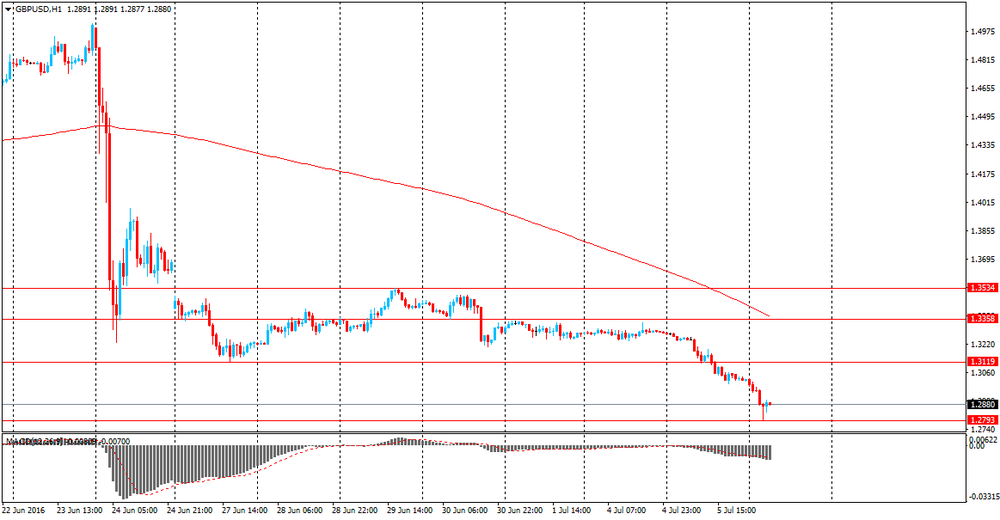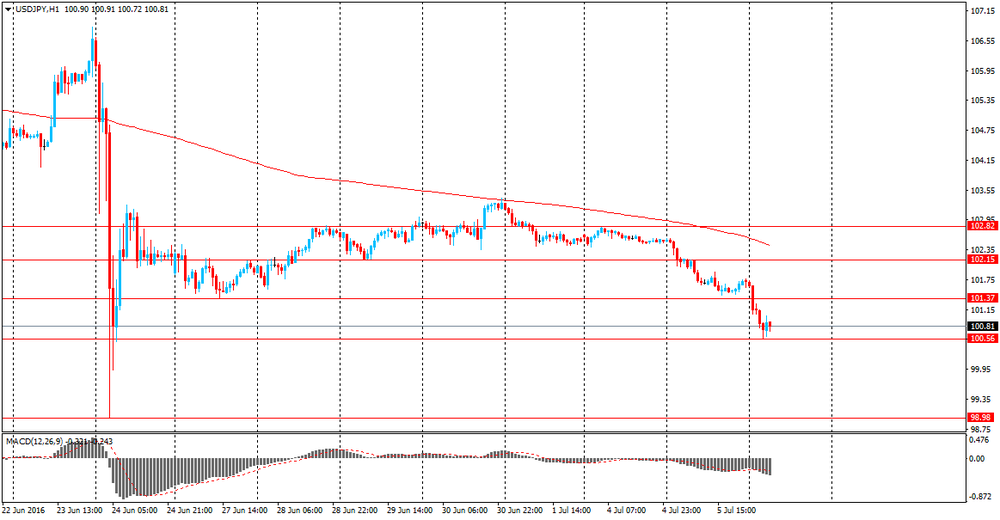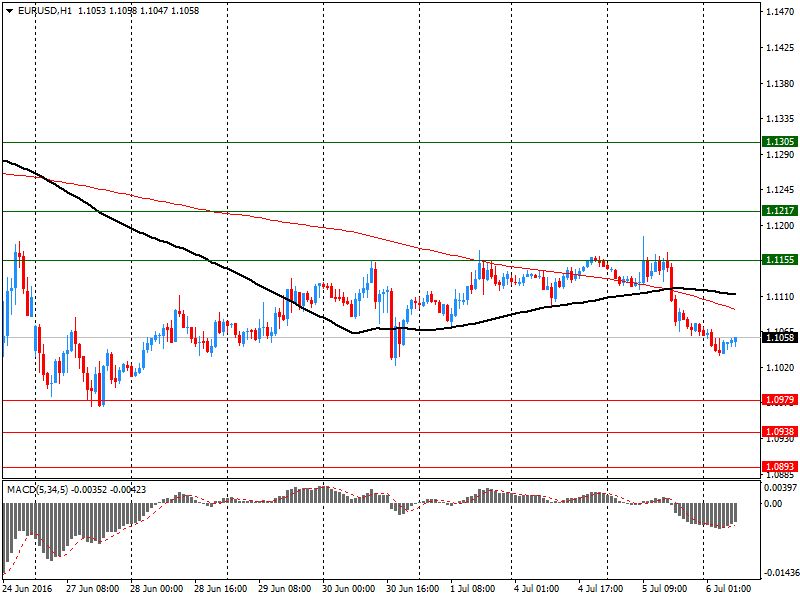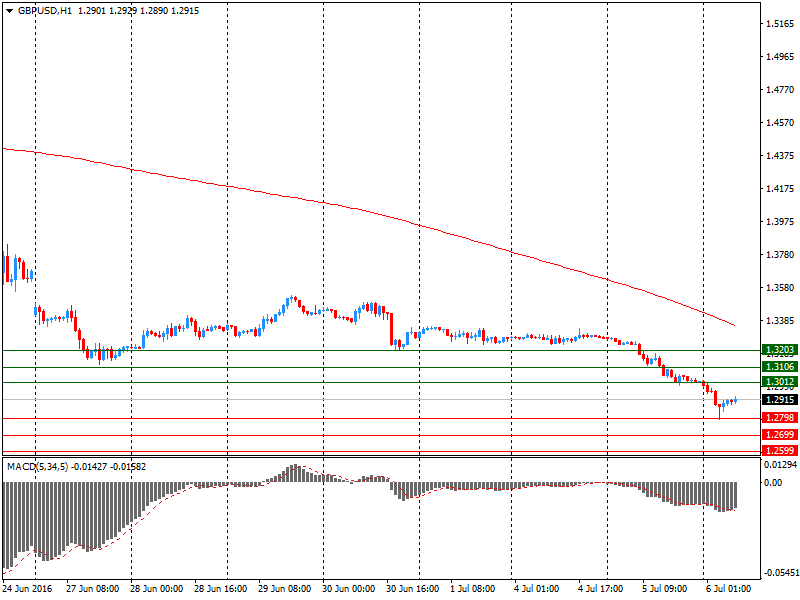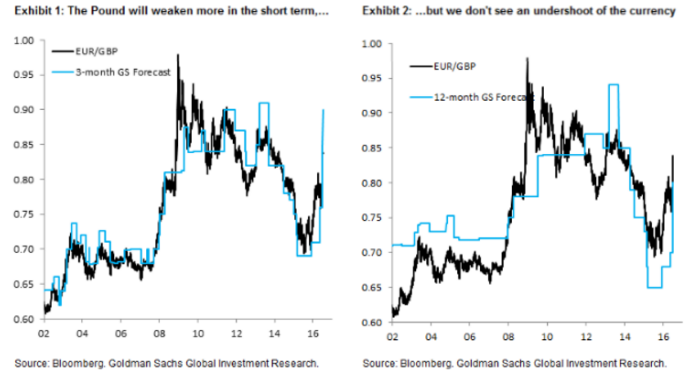Noticias del mercado
-
22:05
Major US stock indexes finished trading with a moderate increase

Major stock indexes on Wall Street have returned the lost positions in the morning on the background of robust economic data and the recovery of oil prices, which helped to mitigate investors' concerns about the global economic downturn.
Data for June from Markit showed a steady growth of business activity in the US service sector, which has helped the most rapid expansion of new orders since the beginning of 2016, however, growth remains weak in comparison with the post-crisis trend, helped by a slowdown in job creation the third consecutive month in June. Business expectations for the year ahead have also continued to soften, while service providers showed the lowest level of optimism since October 2009. The seasonally adjusted PMI index in the services sector rose to 51.4 from 51.3 in May, and signaled a further modest expansion of activity.
In addition, the index of business activity in the US service sector, which is calculated by the Institute of Supply Management (ISM), has improved markedly in June, reaching 56.5 compared with 52.9 in the previous month. According to the forecast, the index value would grow to 53.3. The ISM said that the expansion of activity in the service sector has recorded the 77th consecutive month.
In focus were also reports of the last Fed meeting, which showed that the views of policy makers about economic prospects and interest rates are divided. However, despite the differences, Fed officials agreed that it was justified to wait for additional data before making a decision on further action. For a considerable period of time this year the authorities were preparing for another rate increase, but now investors see almost no chance that the Fed will raise rates in July, after having been released weak data on employment and the UK voted in favor of withdrawal from the EU.
Most of the DOW index components ended the session in positive territory (21 of 30). Outsider were shares of E. I. du Pont de Nemours and Company (DD, -1,88%). Most remaining shares rose Merck & Co. Inc. (MRK, + 2,13%).
Almost all sectors of the S & P showed an increase. conglomerates (-0.7%) sectors fell most. The leader turned out to be the health sector (+ 1.0%).
At the close:
Dow + 0.44% 17,918.35 +77.73
Nasdaq + 0.75% 4,859.16 +36.26
S & P + 0.53% 2,099.72 +11.17
-
21:00
Dow +0.42% 17,916.22 +75.60 Nasdaq +0.73% 4,858.33 +35.43 S&P +0.49% 2,098.73 +10.18
-
18:33
Wall Street. Major U.S. stock-indexes rose
Major U.S. stock-indexes pared losses in late morning trade on Wednesday as robust economic data and recovering oil prices helped alleviate investor concerns about a global economic slowdown.
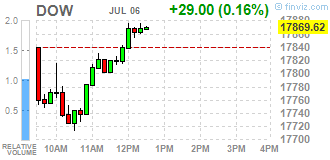
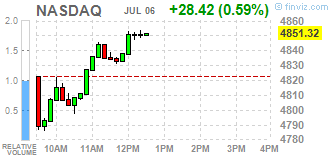
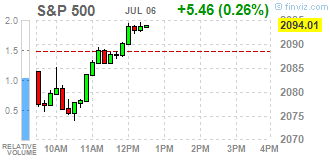
Most of all Dow stocks in positive area (20 of 30). Top looser - E. I. du Pont de Nemours and Company (DD, -1,46%). Top gainer - Merck & Co. Inc. (MRK, +1,45%).
S&P sectors mixed. Top looser - Conglomerates (-1,2%). Top gainer - Healthcare (+0,8%).
At the moment:
Dow 17772.00 +10.00 +0.06%
S&P 500 2085.75 +3.00 +0.14%
Nasdaq 100 4431.50 +27.50 +0.62%
Oil 47.02 +0.42 +0.90%
Gold 1366.90 +8.20 +0.60%
U.S. 10yr 1.39 +0.02
-
18:00
European stocks closed: FTSE 100 6,463.59 -81.78 -1.25% CAC 40 4,085.3 -78.12 -1.88% DAX 9,373.26 -159.35 -1.67%
-
17:49
The price of oil dropped about 1%
Oil quotes are down for a third day, in response to uncertainty about the prospects for consumption due to weak demand from the oil refining companies, as well as a potential slowdown in economic growth after the decision of the UK to leave the EU.
In the United States, a record demand for gasoline from drivers failed to make much impact on the global surplus of gasoline, which has a negative impact on the profitability.
In focus were also reports that the Norwegian oil workers on Wednesday night broke off negotiations on wages. Industry Energy union said that there is a discussion of the further strategy, the parties are open to negotiations, but the possibility of a strike is not excluded.
Investors are also awaiting the US petroleum inventories data that this week will be publised one day later than usual because of the celebration of Independence Day on Monday. The American Petroleum Institute will release its inventories report today, while government data will be released on Thursday at 15:00 GMT. Analysts expect the US Energy Department report tomorrow to show a reduction of oil reserves by 2.5 million barrels.
"Oil is once again testing key support levels and report on petroleum inventories in the US will be the next important event. Particular attention will be focused on the change in stocks of gasoline." - Ole Hansen commodity strategist at Saxo Bank said. Meanwhile, Petromatrix analysts said that if WTI crude oil will overcome the level of $ 45.8, the next support is located at the $ 43 level.
The cost of the August futures for US light crude oil WTI fell to 46.43 dollars per barrel.
The price of August futures for Brent fell to 47.92 dollars a barrel on the London Stock Exchange ICE Futures Europe.
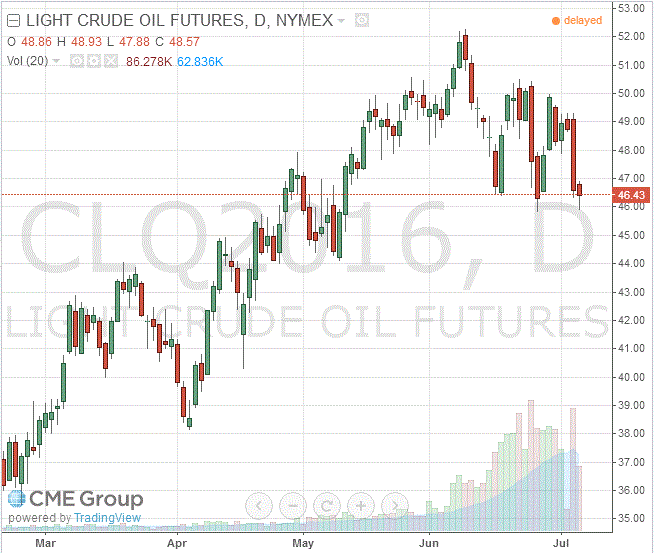
-
17:37
WSE: Session Results
Polish equity market closed lower on Wednesday. The broad market measure, the WIG Index, fell by 1.29%. The WIG sub-sector indices were mainly lower with banking sector stocks' gauge (-2.16%) underperforming.
The large-cap stocks' measure, the WIG30 Index lost 1.58%. A majority of the index components recorded declines with bank MILLENNIUM (WSE: MIL) posting the biggest drop of 6.75%. Other noticeable losers were bank ALIOR (WSE: ALR), footwear retailer CCC (WSE: CCC) and railway freight transport operator PKP CARGO (WSE: PKP), which tumbled by 5.71%, 4% and 3.19% respectively. On the other side of the ledger, IT-company ASSECO POLAND (WSE: ACP) led a handful of gainers with a 1.71% advance, followed by genco ENEA (WSE: ENA) and videogame developer CD PROJEKT (WSE: CDR), which added 1.43% and 0.77% respectively.
-
17:36
Gold prices continue to rise today
Gold prices rose moderately, reaching the highest in more than two years as stock markets and bond yields decline in profitability, some bonds to record lows prompted investors to actively buy safe assets.
European shares fell, while the yield on 10-year German bonds fell to a record low for a second day, as concerns over the impact of Brexit on economic growth embraced global markets and strengthened demand for safe bonds. "On the market returns panic This is reflected not only on the value of gold, but also in the stock markets.", - Said an analyst at LBBW Torsten Proettel. - Bonds are in the red, and big investors are looking for any opportunity to avoid negative interest rates. Since gold may be more interesting to them. "
Experts point out that the rise in price of gold goes along with the strengthening of the US dollar, as it has happened before in times of elevated levels of risk aversion. However, the pound fell to a new 31-year low against the dollar.
The course of trading was also affected by expectations on the FOMC minutes. Investors hope that the protocols will contain clues about the timing of further increases in interest rates. Recall, the increase in rates usually strengthens the dollar and gold prices which are denominated in US currency becomes more expensive for holders of other currencies.
The assets of the world's largest gold exchange-traded fund SPDR Gold Shares rose yesterday at the fastest pace in more than six years. Inventories increased by 28.8 tons to 982.72 tons, the highest level since June 2013.
The cost of the August gold futures on the COMEX rose to $ 1370.1 per ounce.
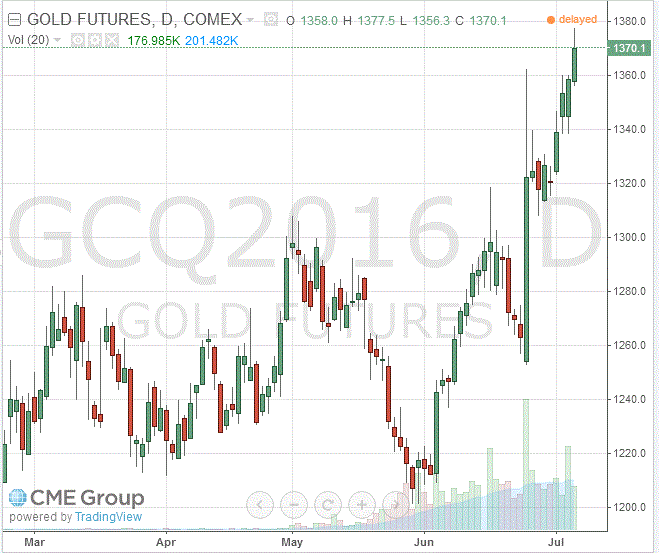
-
17:01
Fed Tarullo: the world financial system "is pretty well prepared" for the Brexit shock
- US Response to Brexit generally in line with our expectations.
- wait to see what will be the macroeconomic consequences of Brexit.
- relevant interest rate depends on the factors affecting the economy.
- the overheating of the US economy is not a danger.
- the Fed probably does not provide much stimulus as many believe.
- Fed has the tools for an adequate response in the event of a sharp acceleration in economic growth.
- for Fed is better to wait for new evidence of rising inflation.
- low interest rates may give rise to financial instability, but this may not be sufficient to justify rate hikes.
- currently there are no worries about financial instability, "bubbles" in asset classes.
-
16:49
Company news: Tesla shares fall further and this is the reason
Tesla Motors (TSLA) shares - US car company in Silicon Valley focused on the production of electric vehicles fall on Wednesday, as the company talked to regulators about the fatal accidents involving a Tesla car who was riding on "autopilot". The event took place nine days earlier.
Tesla found out about the Model S sedan crash in Florida after the accident on 7 May. On May 16th the company reported the accident to the government, according to Reuters.
On June 30 The National Authority for Road Safety (NHTSA) has announced an investigation.
The technology is one of the most advanced and promoted by Tesla, but is still in test mode.
However, according to Elon Musk, Tesla autopilot is safer than human control, since the first deadly incident occurred after Tesla autopilot 200 million km, while the world average for a lethal accident is 100 million km.
TheStreet Ratings has assigned the rating to "sell."
"You can see the weaknesses of the company in many areas, such as deterioration of its net income, generally high risk debt, disappointing return on equity, weak operating cash flow and generally disappointing historical performance shares themselves", - noted the TheStreet.
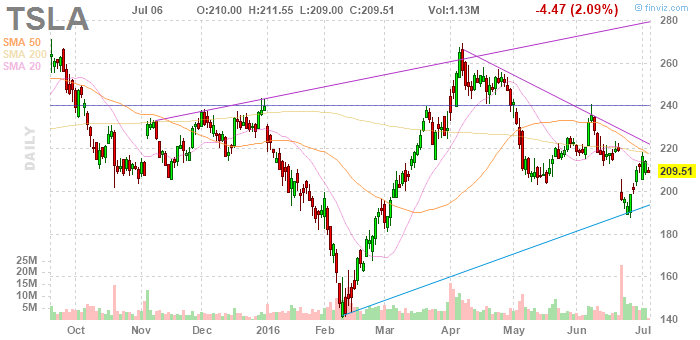
Currently, shares traded at $ 209.51 (-2.09%).
-
16:39
US business activity index for the services sector rose slightly in June
Data for June from Markit showed a steady growth of business activity in the US service sector, which has helped the most rapid expansion of new orders since the beginning of 2016, however, growth remains weak in comparison with the post-crisis trend, helped by a slowdown in job creation for third consecutive month in June. Business expectations for the year ahead have also continued to soften, while service providers showed the lowest degree of optimism ever since the survey began in October 2009.
The seasonally adjusted index of business activity in the US services sector by Markit rose slightly to 51.4 in June from 51.3 in May, and signaled a further slight expansion of service sector activity.
On average, in the second quarter of 2016 the index rose slightly compared with the previous quarter (to 51.8 in Q2 from 51.4 in Q1).
Respondents noted the overall improvement in customer spending, but there were also reports that restrained business confidence and growing economic uncertainty acted as a brake on growth in June.
-
16:13
US ISM non-manufacturing well above forecasts
The report was issued today by the Institute for Supply Management and registered 56.5 percent in June, 3.6 percentage points higher than the May reading of 52.9 percent. This represents continued growth in the non-manufacturing sector at a faster rate. The Non-Manufacturing Business Activity Index increased to 59.5 percent, 4.4 percentage points higher than the May reading of 55.1 percent, reflecting growth for the 83rd consecutive month, at a faster rate in June. The New Orders Index registered 59.9 percent, 5.7 percentage points higher than the reading of 54.2 percent in May. The Employment Index grew 3 percentage points in June after one month of contraction to 52.7 percent from the May reading of 49.7 percent. The Prices Index decreased 0.1 percentage point from the May reading of 55.6 percent to 55.5 percent, indicating prices increased in June for the third consecutive month. According to the NMI®, 15 non-manufacturing industries reported growth in June. Respondents' comments are mostly positive about business conditions and the economy. Overall, the report reflects a strong rebound from the 'cooling-off' of the previous month for the non-manufacturing sector.
The 15 non-manufacturing industries reporting growth in June - listed in order - are: Mining; Arts, Entertainment & Recreation; Management of Companies & Support Services; Retail Trade; Health Care & Social Assistance; Utilities; Real Estate, Rental & Leasing; Accommodation & Food Services; Transportation & Warehousing; Wholesale Trade; Information; Public Administration; Agriculture, Forestry, Fishing & Hunting; Construction; and Finance & Insurance. The three industries reporting contraction in June are: Educational Services; Professional, Scientific & Technical Services; and Other Services.
-
16:00
U.S.: ISM Non-Manufacturing, June 56.5 (forecast 53.3)
-
15:56
WSE: After start on Wall Street
Like yesterday, today also the beginning of the US session is in about 0.5% of declines in major indices. However, unlike yesterday, today's session is the latest in a row of declining, and that means a greater chance of taking by market participants attempt to fight for a growth reflection.
-
15:45
U.S.: Services PMI, June 51.4 (forecast 51.5)
-
15:32
U.S. Stocks open: Dow -0.30%, Nasdaq -0.45%, S&P -0.34%
-
15:31
Option expiries for today's 10:00 ET NY cut
EUR/USD 1.0970, 1.1000/05, 1.1050,1.1100, 1.1160, 1.1185 (551m),1.1240
USD/JPY 99.85,101.00,102.35,103.00,104.00, 104.50,105.00 (757m)
GBP/USD 1.3000, 1.3075,1.3200
AUD/USD 0.7365,0.7470/75,0.7500 (500m), 0.7520
NZD/USD 0.6900,0.7050
USD/CAD 1.2845/50,1.2910/15, 1.2935, 1.2980,1.3100, 1.3125/30/35 (800m)
-
15:26
GBP: en-route towards 1.25 over coming weeks - NAB
"To the outside world the UK is a laughing stock. How could the world's 6th largest economy (depending on how you measure it) go against the advice of three-quarters of MPs, the IMF, BoE, business, not to mention the majority of private economists and tear up over 40-years of EU membership? The vote has seen the UK Prime Minister resign, enacted chaos in Her Majesty's official opposition, pushed Scotland and Northern Ireland to the brink of wanting their own referendum and has seen ratings agencies take the knife to the UK's coveted AAA sovereign rating. Worse. It is not only clear the UK has no leader and no functioning opposition, but apparently no plan; such is the shock and unpreparedness.
Capital outflows seem likely and the BoE appears to be doing its bit to try and ensure the exchange rate is where a large part of the adjustment is seen. Thus we expect to hear more BoE talking down of GBP and in that sense take some of the burden off the Bank in cutting rates.We place the probability of a 25bp rate cut in August at 35-40%. We expect GBP to drift to 1.25 over coming weeks and to as low as $1.20 in 2017. It will take EU political issues to set off EUR weakness and a reversal in the EUR/GBP uptrend".
-
15:14
Before the bell: S&P futures -0.55%, NASDAQ futures -0.64%
U.S. stock-index futures fell as investors fretted over prospects for global growth in the wake of the U.K.'s decision to leave the European Union.
Global Stocks:
Nikkei 15,378.99 -290.34 -1.85%
Hang Seng 20,495.29 -255.43 -1.23%
Shanghai Composite 3,017.1 +10.71 +0.36%
FTSE 6,438.16 -107.21 -1.64%
CAC 4,079.93 -83.49 -2.01%
DAX 9,347.23 -185.38 -1.94%
Crude $46.05 (-1.18%)
Gold $1371.50 (+0.94%)
-
14:54
Wall Street. Stocks before the bell
(company / ticker / price / change ($/%) / volume)
ALCOA INC.
AA
9.15
-0.11(-1.1879%)
32068
ALTRIA GROUP INC.
MO
69.6
-0.01(-0.0144%)
1425
Amazon.com Inc., NASDAQ
AMZN
725.05
-3.05(-0.4189%)
18944
AMERICAN INTERNATIONAL GROUP
AIG
51
-0.21(-0.4101%)
2511
Apple Inc.
AAPL
94.52
-0.47(-0.4948%)
115976
AT&T Inc
T
42.77
-0.10(-0.2333%)
28578
Barrick Gold Corporation, NYSE
ABX
22.8
0.40(1.7857%)
111098
Boeing Co
BA
126.17
-0.80(-0.6301%)
1856
Caterpillar Inc
CAT
73.61
-0.77(-1.0352%)
2508
Chevron Corp
CVX
102.86
-0.71(-0.6855%)
397
Cisco Systems Inc
CSCO
28.19
-0.14(-0.4942%)
6428
Citigroup Inc., NYSE
C
40.07
-0.71(-1.7411%)
53833
Exxon Mobil Corp
XOM
92.41
-0.61(-0.6558%)
5371
Facebook, Inc.
FB
113.31
-0.69(-0.6053%)
34625
Ford Motor Co.
F
12.32
-0.08(-0.6452%)
41581
Freeport-McMoRan Copper & Gold Inc., NYSE
FCX
10.29
-0.21(-2.00%)
240030
General Electric Co
GE
31.27
-0.18(-0.5723%)
31641
General Motors Company, NYSE
GM
27.95
-0.22(-0.781%)
15095
Goldman Sachs
GS
142.55
-1.90(-1.3153%)
4998
Intel Corp
INTC
32.52
-0.16(-0.4896%)
3959
Johnson & Johnson
JNJ
122.16
-0.11(-0.09%)
1357
JPMorgan Chase and Co
JPM
58.75
-0.80(-1.3434%)
11272
McDonald's Corp
MCD
119
-1.76(-1.4574%)
20949
Merck & Co Inc
MRK
57.85
-0.15(-0.2586%)
550
Microsoft Corp
MSFT
50.86
-0.31(-0.6058%)
3244
Nike
NKE
54.75
-0.45(-0.8152%)
3241
Pfizer Inc
PFE
35.73
-0.08(-0.2234%)
1331
Procter & Gamble Co
PG
85.16
-0.28(-0.3277%)
650
Starbucks Corporation, NASDAQ
SBUX
56.51
-0.26(-0.458%)
1105
Tesla Motors, Inc., NASDAQ
TSLA
210.25
-3.73(-1.7432%)
47304
The Coca-Cola Co
KO
45.38
-0.05(-0.1101%)
630
Twitter, Inc., NYSE
TWTR
17.02
-0.12(-0.7001%)
31273
United Technologies Corp
UTX
100.33
-0.29(-0.2882%)
711
UnitedHealth Group Inc
UNH
141
-0.56(-0.3956%)
561
Verizon Communications Inc
VZ
55.85
-0.115(-0.2055%)
6480
Visa
V
74.28
-0.39(-0.5223%)
1200
Wal-Mart Stores Inc
WMT
73.02
-0.12(-0.1641%)
1280
Walt Disney Co
DIS
97.1
-0.56(-0.5734%)
1193
Yahoo! Inc., NASDAQ
YHOO
37.29
-0.21(-0.56%)
5494
Yandex N.V., NASDAQ
YNDX
21.25
-0.40(-1.8476%)
100
-
14:51
Upgrades and downgrades before the market open
Upgrades:
Downgrades:
Other:
Apple (AAPL) initiated with a Buy at Longbow; target $125
Tesla Motors (TSLA) target lowered to $190 from $212 at Pacific Crest
-
14:49
European session review: the pound recovered slightly from new multi-year lows
The following data was published:
(Time / country / index / period / previous value / forecast)
6:00 Germany Factory Orders m / m in May -2.0% 1% 0%
7:30 Speech Australia RBA assistant head G. Debellya
8:00 It Eurozone ECB President M. Draghi
Gbp/Usd dropped significantly before the start of the current session, dropping below the level which was considered a strong support - $ 1.30, and reached the lowest level in 31 years $ 1.2794.
The pair then rebounded to $ 1.3014, but analysts do not rule out a new round of selling. The pound fell after three British investment fund, engaged in real estate, suspended early repayment. This has called into question the health of the housing market and the economy in general and the increased concern about the outflow from UK.
"The basis for the UK economic growth remains weak, given the approaching 7% deficit of the current account of the balance of payments, as well as the fact that foreign investors believe the country is mired in uncertainty," - says Simon Smith.
"At the moment, the pound recovered after declining the previous day, but whatever its growth will be relatively short-lived," - said Keith Jax from Societe Generale.
"Looks more likely that GBP / USD will trade in $ 1.20-1.25 range", - he added.
The pound came under selling pressure after the Bank of England warned of "representing the complexity of the financial stability risks resulting after Brexit and reduced requirements for the volume of capital reserves for banks.
The head of the Bank of England Governor Mark Carney said that this move implies "substantial changes" to help the economy overcome the consequences of Britain leaving the EU.
In its report on Financial Stability, issued twice a year, the Bank of England said that the threats which he feared after the referendum began to materialize. The pound fell to its lowest level in 31 years, and the financial sector stocks have fallen by 20%.
Last week, Carney has signaled that more stimulus may be needed this summer, strengthening expectations of a possible rate cut by the end of August.
Euro stabilized against the dollar after a decline earlier in the day on the background data on factory orders in Germany. The volume of orders in Germany industry has not changed compared to the previous month, when the decline was 1.9% , data from the Ministry of Economy of Germany suggests. Forecasts indicated +1%.
Orders in May 2015 decreased by 0.2%, while experts predicted an increase of 0.9%.
The volume of orders received from Germany decreased by 1.9%. Export orders from outside the euro zone in the last month - 0.3%, while orders from other countries in the currency bloc jumped by 4%.
Demand for consumer goods decreased by 0.4%.
This year, business confidence and the German economy to suffer from the weak global economic growth and trade, restrained increase corporate profits and risks associated with Brexit. As stated by the head of the Bundesbank, Jens Weidmann last week, Brexit could further weaken the German economy.
In June, the Bundesbank cut its growth forecasts for the German economy in the years 2016 and 2017, to 1.7% and 1.4%, respectively, from 1.8% and 1.7%.
EUR / USD: during the European session, the pair has risen to $ 1.1078
GBP / USD: during the European session, the pair has risen to $ 1.3014
USD / JPY: during the European session, the pair fell to Y100.19
-
14:36
Growing US trade balance deficit
The U.S. Census Bureau and the U.S. Bureau of Economic Analysis, announced that the goods and services deficit was $41.1 billion in May, up $3.8
billion from $37.4 billion in April, revised. May exports were $182.4 billion, $0.3 billion ess than April exports. May imports were $223.5 billion, $3.4 billion more than April imports.
The May increase in the goods and services deficit reflected an increase in the goods deficit of $3.7 billion to $62.2 billion and a decrease in the services surplus of $0.1 billion to $21.1 billion.
Year-to-date, the goods and services deficit decreased $7.2 billion, or 3.5 percent, from the same period in 2015. Exports decreased $47.2 billion or 4.9 percent. Imports decreased $54.3 billion or 4.7 percent.
The average goods and services deficit decreased $1.0 billion to $38.0 billion for the three months ending in May.
* Average exports of goods and services increased $0.1 billion to $181.7 billion in May.
* Average imports of goods and services decreased $0.9 billion to $219.8 billion in May.
-
14:33
Canadian trade balance showing a deficit in May
Canada's exports of energy products increased 7.1% to $5.3 billion in May. For the section as a whole, prices were up 9.7%, while volumes were down 2.3%. Exports of crude oil and crude bitumen were the principal contributor to the gain, up 10.5% to $3.8 billion, mostly on higher prices (+9.9%). Volumes also rose (+0.6%) despite the wildfires in northeastern Alberta. Preliminary evidence indicates that Canadian refinery activity declined in May, freeing up crude oil supply for export, while the remaining shortfall was largely met by a drawdown of Alberta inventories of crude oil. Finally, although crude oil and crude bitumen export volumes for May increased, export volumes for April and May were below recent levels.
Imports of energy products increased 18.2% to $2.1 billion in May, the third consecutive monthly gain. Volumes were up 12.1% and prices rose 5.5%. Widespread increases throughout the section were led by refined petroleum energy products, up 63.8% to $694 million.
In real (or volume) terms, exports decreased 2.3% in May, led by energy products; farm, fishing and intermediate food products; and motor vehicles and parts. Import volumes were down 0.9%, as lower imports of aircraft and other transportation equipment and parts, and metal and non-metallic mineral products were partially offset by higher imports of energy products. Consequently, Canada's trade balance in real terms went from a $213 million surplus in April to a $317 million deficit in May.
-
14:30
U.S.: International Trade, bln, May -41.14 (forecast -40)
-
14:30
Canada: Trade balance, billions, May -3.28 (forecast -2.7)
-
13:51
Orders
EUR/USD
Offers : 1.1150 1.1140 1.1120 1.1090/95 1.1080 1.1060
Bids: 1.1040 1.1020/25 1.1000/10 1.0975/80 1.0950 1.0920/25 1.0900
GBP/USD
Offers : 1.3120 1.3100 1.3090 1.3080 1.3050 1.3030 1.3000
Bids: 1.2900/10 1.2880 1.2850 1.2800 1.2700 1.2600 1.2500
EUR/GBP
Offers : 0.8650 0.8625/30 0.8600 0.8580 0.8560
Bids: 0.85000 0.8475 0.8450 0.8400/10
EUR/JPY
Offers : 113.50 113.30 113.00 112.80 112.50 112.00
Bids: 111.00/10 110.75 110.50 110.00
USD/JPY
Offers : 102.25 102.00 101.75/80 101.50 101.40 101.20/25 101.00
Bids: 100.50 100.30 100.00 99.80/85 99.50
AUD/USD
Offers : 0.7550 0.7520/25 0.7500 0.7470/75
Bids: 0.7430 0.7420 0.7400/10 0.7380 0.7350
-
13:36
Lionel Messi has been sentenced to 21 months in prison over a tax fraud case
According to Sky news, Barcelona football star Lionel Messi has been sentenced to 21 months in prison over a tax fraud case in Spain.
However, the striker - generally considered the best in the world currently - is unlikely to face any time in jail as a term of under two years in duration, for a non-violent offence, usually results in a period of probation under Spanish law.
The court in Barcelona found the Argentina player and his father, who handles his financial affairs, guilty of three offences.
Jorge Messi was also handed a 21-month prison term and fine of €1.7m (£1.4m).
His son, who is understood to earn £26m in annual salary under his current club contract alone and is said to be worth at least £240m, was told to pay €2m (£1.7m).
-
13:10
WSE: Mid session comment
Very poor attitude of the environment, with new lows on the afternoon phase, keeps the pressure on the Warsaw Stock Exchange, where the consequences are beginning to be seen quite widely, in all market segments. The WIG20 index fell in the middle of the session by 1.66% (1,687 points), the index of medium-sized companies mWIG40 lost 0.8% and like the sWIG80 (-0.4%) set new lows.
Decreases take place also in Western Europe - the German DAX lost more than 2 percent.
The turnover on the WSE (the WIG20) reach PLN 330 mln, and the highest volume of trade recorded KGHM with a fall of 1.1 percent. The second is Pekao (WSE: PEO) with a fall of 1.6 percent., the third Orlen (WSE: PKN), which lost 1.5 percent.
-
12:41
Major stock indices in Europe declined
Most European stock indices fall on the background of a new wave of concerns about the effects of Brexit for the global economy.
FTSE rose at the opening due to the weakening of the pound sterling, supporting shares of exporters, as well as the rise of securities of mining companies following an increase in the price of gold.
The composite index of the largest companies in the region, Stoxx Europe 600 fell during trading 1,1% - to 320.50 points.
Shares of Volkswagen AG lost 0.2%, shares of BMW AG fell 0.6%, while shares of Daimler AG retreated 0.4% on reports that Germany's antitrust regulators started an investigation.
Shares of British alcohol producer Diageo rose in price by 1,7%, British American Tobacco - by 0.4%.
Shares of Burberry Group, one of the world's leading manufacturers of "luxury" items rose1%. Experts at UBS improved the 12-month target price of shares for the company up to 17 pounds from 15 pounds and recommended investors to "buy" Burberry, noting that the weakening pound compensates for the weakness of retail demand.
Securities of gold mining companies Fresnillo and Randgold Resources jumped by 4.5% and 4.7%.
"The insurance sector also came under pressure after the Bank of England Governor Mark Carney said that fears surrounding the area, in tough economic conditions".
Shares of British Insurers Standard Life, Aviva and Prudential fell during trading on Wednesday by 1.7%, 2.5% and 1.4%. Earlier these companies have suspended trading securities of real estate funds, as investors began to withdraw investments due to Brexit.
Shares of construction companies Barratt Developments and Taylor Wimpey dropped by 4.3% and 3.5%.
The cost of airline EasyJet shares fell 2.1%. EasyJet reported an increase in the number of passengers carried in June by 5.8% - to 6.56 million people. The growth rate, however, was worse than the average for the 12 months (7.1%).
Shares of Spanish Caixabank fell 0.4% after the lender warned that the expected loss amount of 1.25 billion euros ($ 1.4 billion) related to mortgage loans.
At the moment:
FTSE 6522.46 -22.91 -0.35%
DAX 9373.93 -158.68 -1.66%
CAC 4092.51 -70.91 -1.70%
-
11:52
Eurozone retail sales below forecasts
June saw contrasting trends in retail sector performance across the single currency area, according to the latest Markit Eurozone Retail PMI . While there were slight increases in sales across both Germany and France, the overall picture was darkened by a sharp and accelerated reduction in sales in Italy.
The headline Markit Eurozone Retail PMI - which tracks month-on-month changes in like-for-like retail sales in the bloc's biggest three economies combined - registered 48.5 in June, down from May's 50.6. It was the index's third sub-50 reading - signalling a drop in sales - in the past four months. Sales were also down compared with the same month one year before, albeit only slightly.
Phil Smith, economist at Markit which compiles the Eurozone Retail PMI survey, said: "The biggest talking point will be Italy's sharp drop in sales, which contrasted with upturns across both France and Germany. Clearly consumer spending is on the wane in the eurozone's third-largest economy after recent tentative signs of recovery. But it was a brighter picture for retailers in France, where back-to-back increases in sales were recorded for the first time in two years and employment edged higher. Germany remained the best performer overall, although sales growth there eased from the solid pace seen in May."
-
11:47
UK: shop prices fell in June - BRC
In the UK the prices in shops have fallen at a faster pace in June, said on Wednesday the British Retail Consortium (BRC).
Prices in shops decreased by 2 percent in June compared with a year ago, there were more than 1.8 percent decline in May.
Food prices fell by 0.8 per centper y/y, noting the largest decline in more than a year.
The survey was conducted in the period from 6 to 10 June, before the British voted for withdrawal from the EU.
-
11:43
The MICEX fell by 0.3% to 1890.5 points
The Moscow Stock Exchange fell by 0.3% to 1890.5 points at the opening.
-
11:00
Oil is trading slightly lower
This morning, New York crude oil futures for WTI fell -0.04% to $ 46.58 per barrel. At the same time, Brent oil futures were down -0.10% to $ 47.98 per barrel. Thus, the black gold is trading slightly down, amid fears that Brexit can lead to lower oil demand, an extended period of weak global economic growth and maintain a negative trend in the market. Also, to strengthening US dollar is putting pressure on the cost of black gold as oil prices are linked to the most used currency.
-
10:23
Review of financial and economic press: The Bank of England lowerd requirements for UK banks
D/W
Austrian presidential re-election scheduled for 2 October
The Constitutional Court in Vienna declared invalid the presidential elections, held on May 22 because of procedural violations during the vote count. There were no indications of fraud or manipulation in the elections.
newspaper. ru
The Bank of England lowerd requirements for UK banks
The Bank of England lowered its requirement for banks to 0.5 percent a countercyclical capital buffer, as shown in a published report on financial stability.
FT: US oil and gas companies are experiencing problems with financing
US oil and gas companies are facing serious difficulties in raising finance, writes Financial Times. It is noted that the bond sales fell to the lowest value in more than a decade. Thus, according to Dealogic, in the second quarter US companies involved in the exploration and production sold US bonds for only $ 280 million, which is the lowest value since the time of financial crisis of 2008-2009.
RBC
Oil companies have announced major investments in production after the collapse of prices
Chevron and its partners officially announced plans to invest $ 36.8 billion to increase oil production at the Tengiz field in Kazakhstan. This project will be the largest since the beginning of the period of low oil prices
-
10:22
Option expiries for today's 10:00 ET NY cut
EUR/USD 1.0970, 1.1000/05, 1.1050,1.1100, 1.1160, 1.1185 (551m),1.1240
USD/JPY 99.85,101.00,102.35,103.00,104.00, 104.50,105.00 (757m)
GBP/USD 1.3000, 1.3075,1.3200
AUD/USD 0.7365,0.7470/75,0.7500 (500m), 0.7520
NZD/USD 0.6900,0.7050
USD/CAD 1.2845/50,1.2910/15, 1.2935, 1.2980,1.3100, 1.3125/30/35 (800m)
-
09:52
ECB representative Villeroy: The Bank of France is waiting for 1.4% GDP growth in 2016
- There is no reason for pessimism regarding Brexit.
- If the United Kingdom will get access to the single market, it would have to comply with all the rules.
- It is necessary to reduce the uncertainty caused by Brexit as soon as possible.
- Brexit hasn't changed the forecast for the French economy in 2016.
- Brexit had an impact on the euro area economy.
- ECB mobilized to combat the effects of Brexit.
- consequences will be most severe for the UK.
-
09:16
2.0% inflation cand be achieved with ¥20tn stimulus - Fujii
According to Bloomberg:
- Fuji suggests ¥20 trn stimulus this fiscal year.
- Abe can end deflation with ¥37tn fiscal stimulus over three years.
- Negative rates strongly push investment.
-
09:15
WSE: After opening
The futures market began from the decline of 0.29% to 1,707 points. At the same time, the contract for German DAX lost 0.6%. Thanks to it, the Warsaw market walked up to the start of trading quite calmly.
WIG20 index opened at 1716.30 points (+0.02%)
WIG 44074.59 -0.10%
WIG30 1919.45 -0.19%
mWIG40 3329.96 0.09%
*/ - change to previous close
The cash market opens with cosmetic rise of the 0.02% to 1,726 points., which is a very good result in relation to the environment, where the indices in France and Germany start sessions of declines of around 0.9%. Thus, the relative strength of the Warsaw Stock Exchange maintains and we must wait for the first signs of improving sentiment in the environment and scale of the reaction to it in Warsaw.
-
09:07
Today’s events:
At 07:00 GMT the ECB president Mario Draghi will deliver a speech
At 07:30 GMT ECB Board Member Peter Preat will make a speech
At 07:30 GMT RBA Assistant Governor Guy Debell deliver a speech.
At 09:30 GMT the ECB Vice-President Vitor Constancio will give a speech.
At 12:00 GMT the ECB member Yves Mersch will make a speech.
At 13:00 GMT FOMC Member Daniel Tarullo deliver a speech.
-
08:44
Mixed start of trading expected on the major stock exchanges in Europe: DAX + 0,2%, FTSE 100 -0,8%, CAC 40 + 0.1%
-
08:42
Asian session review: the pound hit hard in a “risk off” enviroment
The US dollar fell against the yen below Y101,00, to Y100,60, as the active sale of the British pound had an upward pressure on the Japanese currency. In addition, the yen is supported by closure of long positions in the currencies of emerging markets.
Brexit fears reignited and anxiety for the Italian banking system also contributes to the pesimistic mood of investors, so that the pound and the euro moving down and the yen, which is a safe haven, is in demand.
According to analysts, the Bank of Japan is unlikely to hold an intervention to limit the strengthening of the yen against the US dollar if Japanese Finance Minister will not make a statement. Probably, the central bank will take a wait and see attitude, and will coordinate with the Federal Reserve, before taking any measures.
GBP / JPY also fell by 1.4% compared to the closing level of the New York session on Tuesday.
"We are seeing a situation similar to that observed soon after Brexit pound selling, euros and yen demand - the most popular currency in terms of risk aversion," - notes ANZ
During the Asian session the British pound fell reaching a new historic low of $ 1.2794. Pound again began to fall, the first time since June 1985 touched the level of $ 1.30. The cause of this trend is the new wave of concerns about the consequences of Britain's exit from the European Union.
Yesterday, the Bank of England said it sees risks reducing capital inflows after the referendum and believes that a sustained reduction in capital inflows will put further downward pressure on the pound. Against this background, the Central Bank decided to reduce the capital requirements for banks in the country, which would allow British banks to issue more loans totaling $ 150 billion pounds and ensure adequate levels of lending. Reuters survey showed that 33 of 52 economists expect that in July, the Central Bank will left unchanged the monetary policy, 17 respondents forecast a rate cut by 0.25% and 2 economists - 0.5%. The average forecast reflects a 80% probability of a rate cut this year.
The New Zealand dollar fell below $ 0.7100 in the absence of risk appetite. Commodity currencies such as the Nzd, Aud and Cad retain a tendency to decrease.
EUR / USD: during the Asian session, the pair was trading in the $ 1.1035-60 range.
GBP / USD: fell to 1.2794.
USD / JPY: fell to Y100.54
-
08:33
Options levels on wednesday, July 6, 2016:
EUR/USD
Resistance levels (open interest**, contracts)
$1.1305 (2288)
$1.1217 (3512)
$1.1155 (1391)
Price at time of writing this review: $1.1058
Support levels (open interest**, contracts):
$1.0979 (8837)
$1.0938 (5384)
$1.0893 (15194)
Comments:
- Overall open interest on the CALL options with the expiration date July, 8 is 43565 contracts, with the maximum number of contracts with strike price $1,1500 (5314);
- Overall open interest on the PUT options with the expiration date July, 8 is 88854 contracts, with the maximum number of contracts with strike price $1,0900 (15194);
- The ratio of PUT/CALL was 2.04 versus 2.08 from the previous trading day according to data from July, 5
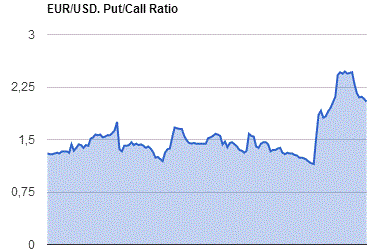
GBP/USD
Resistance levels (open interest**, contracts)
$1.3203 (2032)
$1.3106 (155)
$1.3012 (1506)
Price at time of writing this review: $1.2915
Support levels (open interest**, contracts):
$1.2798 (701)
$1.2699 (253)
$1.2599 (195)
Comments:
- Overall open interest on the CALL options with the expiration date July, 8 is 35734 contracts, with the maximum number of contracts with strike price $1,5000 (4014);
- Overall open interest on the PUT options with the expiration date July, 8 is 44251 contracts, with the maximum number of contracts with strike price $1,3500 (4738);
- The ratio of PUT/CALL was 1.24 versus 1.32 from the previous trading day according to data from July, 5
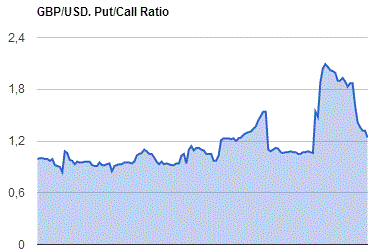
* - The Chicago Mercantile Exchange bulletin (CME) is used for the calculation.
** - Open interest takes into account the total number of option contracts that are open at the moment.
-
08:30
Goldman Sachs cuts Eur and Gbp forecasts
"Following the Brexit surprise, we revised our Sterling forecasts weaker, but - amid lots of doomsday scenarios for the Pound - resisted the temptation to forecast a free-fall. Now that markets have settled somewhat, we are switching to forecast a second leg of weakness for the Pound, as the Bank of England's policy response drives the currency weaker.
...The market is not discounting the easing effect of asset purchases, the persistence of easier monetary conditions in the UK, and the US-UK monetary policy divergence that we expect nearly as much as it should.
Next week, we expect the BoE to provide a further indication of the scope of the conventional and unconventional monetary policy measures we expect. This will be the catalyst for a further downward move in Sterling.
...Turning to the Euro, the negative growth spill-overs that our economists expect is a cumulative 0.5 percent over two years (compared with 2.75 percent for the UK). This slowdown implies downside risks to our already low inflation projections and puts additional pressure on the ECB to step up the pace of monetary accommodation.
Our economists expect an extension of the asset purchase programme through 2018 and a shift away from the ECB's capital key. The latter change could reduce market worries over Bund scarcity and, in our view, could lead to more EUR/$ weakness.
Our new EUR/GBP forecast is 0.90, 0.86 and 0.80 in 3-, 6- and 12-months (from 0.85, 0.82 and 0.78 previously), i.e. builds in more Sterling weakness in the near term. We also revise our EUR/$ forecast to 1.08, 1.04 and 1.00 in 3-, 6- and 12-months (from 1.12, 1.10 and 1.05 previously).
These changes imply a new path for GBP/$ of 1.20, 1.21 and 1.25 in 3-, 6- and 12-months, i.e. substantially more front-loaded downside than in our forecast in the immediate aftermath of the Brexit vote (1.32, 1.34 and 1.35)".
-
08:27
Bloomberg survey: EU is moving in the wrong direction
Bloomberg news agency has conducted a survey among the French, which resulted in the majority stating that the EU is moving in the wrong direction recently. Also many believe that the way out of the EU would have negative consequences.
-
08:25
WSE: Before opening
The US market at yesterday's session lost 0.7%, while in the morning futures on the S&P500 are falling by almost 0.4%. Since the beginning of the week the mood in the world is deteriorating, and this trend is also visible today's morning. Asian parquets lose and the leader of declines is, falling by more than 2%, Nikkei, which negatively reacts to the strengthening of the yen. Strongly lose the pound, and gold in the morning went out on the new post-Brexit highs.
All this is due to concerns about the condition of the global economy, which yesterday led to declines in Europe and the USA. These concerns were translated into strong demand for the currency of "security". The yen is rising to its highest from three years level. The CHF index improves their annual highs, and the dollar index today was the highest in 15 years.
Such an environment is not favorable for the beginning of today's trading in Europe and on the Warsaw market. Therefore, today we may have to reckon with the possibility of further deepening of downward movement, mainly for the reason of external factors.
The macro calendar today does not contain the most important information. In the USA, because of Monday's holiday, will be published today the PMI and ISM reading for services sector, and in the evening the minutes of the last FOMC meeting.
-
08:24
-
08:20
Australia’s 10-yr govt bond yield falls to 1.849% - record low - as risk aversion prevails. Gold up
-
08:17
Japan's 20yr yield declines to a record low of 0.005%
-
08:17
German factory orders unchanged in May
As reported by the Federal Statistical Office (Destatis) on the basis of provisional data, the manufacturing sector saw new orders unchanged in real terms adjusted for seasonally fluctuations and working-day variations in May 2016 compared with April 2016. For April 2016, revision of the preliminary outcome resulted in a decrease of 1.9% compared with March 2016 (primary -2.0%). Price-adjusted new orders without major orders in manufacturing had increased in May 2016 a seasonally and working-day adjusted 0.5% on April 2016.
In May 2016, domestic orders decreased by 1.9%, while foreign orders increased by 1.4% on the previous month. New orders from the euro area were up 4.0% on the previous month, while new orders from other countries decreased by 0.3% compared to April 2016.
In May 2016 the manufacturers of intermediate goods fell 2.9%, while the manufacturers of capital goods showed an increase of 1.9% on the previous month. For consumer goods, a decrease in new orders of 0.4% was recorded.
-
08:11
Germany: Factory Orders s.a. (MoM), May 0% (forecast 1%)
-
07:09
Global Stocks
European stocks moved sharply lower again Tuesday, as concerns over the U.K.'s Brexit vote gripped the market after three London asset manages suspended trading in a property funds.
A more than 4% slide in oil prices further hurt the investment mood.
U.K. fund fears: The financial sector posted the biggest losses in Europe, after three U.K. asset managers froze funds exposed to U.K. property because of a rapid increase in redemptions following the June 23 EU referendum.
The Bank of England also noted in its Financial Stability Report out earlier on Tuesday "that some risks have begun to crystallize" in the aftermath of the vote. In an effort to soothe the economy through bank lending, the central bank cut the so-called countercyclical capital buffer for banks to zero from 0.5%.
U.S. stock investors quashed a four-session rally Tuesday as Brexit-related uncertainties resurfaced to spook the market, on a day marked by light-trading volume following Independence Day.
A sharp drop in crude-oil prices contributed to the overall sentiment, weighing on energy shares.
The S&P 500 index SPX, -0.68% lost 14.40 points, or 0.7%, to close at 2,088.55.
The Dow Jones Industrial Average DJIA, -0.61% fell 108.75 points, or 0.6%, to end at 17,840.62, bouncing back from its intraday low of 17,785. The Nasdaq Composite COMP, -0.82% lost 39.67 points, or 0.8%, to close at 4,822.90, after trading as low as 4,797.
Asian share markets turned tail on Wednesday as fears over instability in the European Union returned with a vengeance, sending the pound to three-decade lows and hammering risky assets of all stripes.
Spooked investors rushed into safe-haven sovereign debt and took markets deeper into unknown territory.
"Financial markets appear to have taken a more realistic view around the complexity and uncertainty characterizing the global political background and its impact on already lackluster economic growth," wrote analysts at ANZ in a note.
-
04:01
Nikkei 225 15,219.87 -449.46 -2.87%, Hang Seng 20,441.17 -309.55 -1.49%, Shanghai Composite 3,006.04 -0.35 -0.01%
-
02:33
Commodities. Daily history for Jul 05’2016:
(raw materials / closing price /% change)
Oil 46.75 +0.32%
Gold 1,362.40 +0.27%
-
02:32
Stocks. Daily history for Jun Jul 05’2016:
(index / closing price / change items /% change)
Nikkei 225 15,669.33-106.47-0.67%
Hang Seng 20,791.54-267.66-1.27%
S&P/ASX 200 5,228-53.77-1.02%
Shanghai Composite 3,007.11+18.51+0.62%
Topix 1,256.64-5.33-0.42%
FTSE 100 6,545.37 +23.11 +0.35 %
CAC 40 4,163.42 -71.44 -1.69 %
Xetra DAX 9,532.61 -176.48 -1.82 %
S&P 500 2,088.55 -14.40 -0.68 %
NASDAQ Composite 4,822.9 -39.67 -0.82 %
Dow Jones 17,840.62 -108.75 -0.61 %
-
02:31
Currencies. Daily history for Jul 05’2016:
(pare/closed(GMT +3)/change, %)
EUR/USD $1,1066 -0,74%
GBP/USD $1,3020 -2,00%
USD/CHF Chf0,9771 +0,60%
USD/JPY Y101,71 -0,80%
EUR/JPY Y112,56 -1,55%
GBP/JPY Y132,43 -2,82%
AUD/USD $0,7457 -0,98%
NZD/USD $0,7149 -1,08%
USD/CAD C$1,2985 +1,06%
-
02:02
Schedule for today, Wednesday, Jul 06’2016:
(time / country / index / period / previous value / forecast)
6:00 Germany Factory Orders s.a. (MoM) May -2.0% 1%
12:30 Canada Trade balance, billions May -2.94 -2.7
12:30 U.S. International Trade, bln May -37.4 -40
13:45 U.S. Services PMI (Finally) June 51.3 51.5
14:00 U.S. ISM Non-Manufacturing June 52.9 53.3
23:30 Australia AiG Performance of Construction Index June 46.7
-
